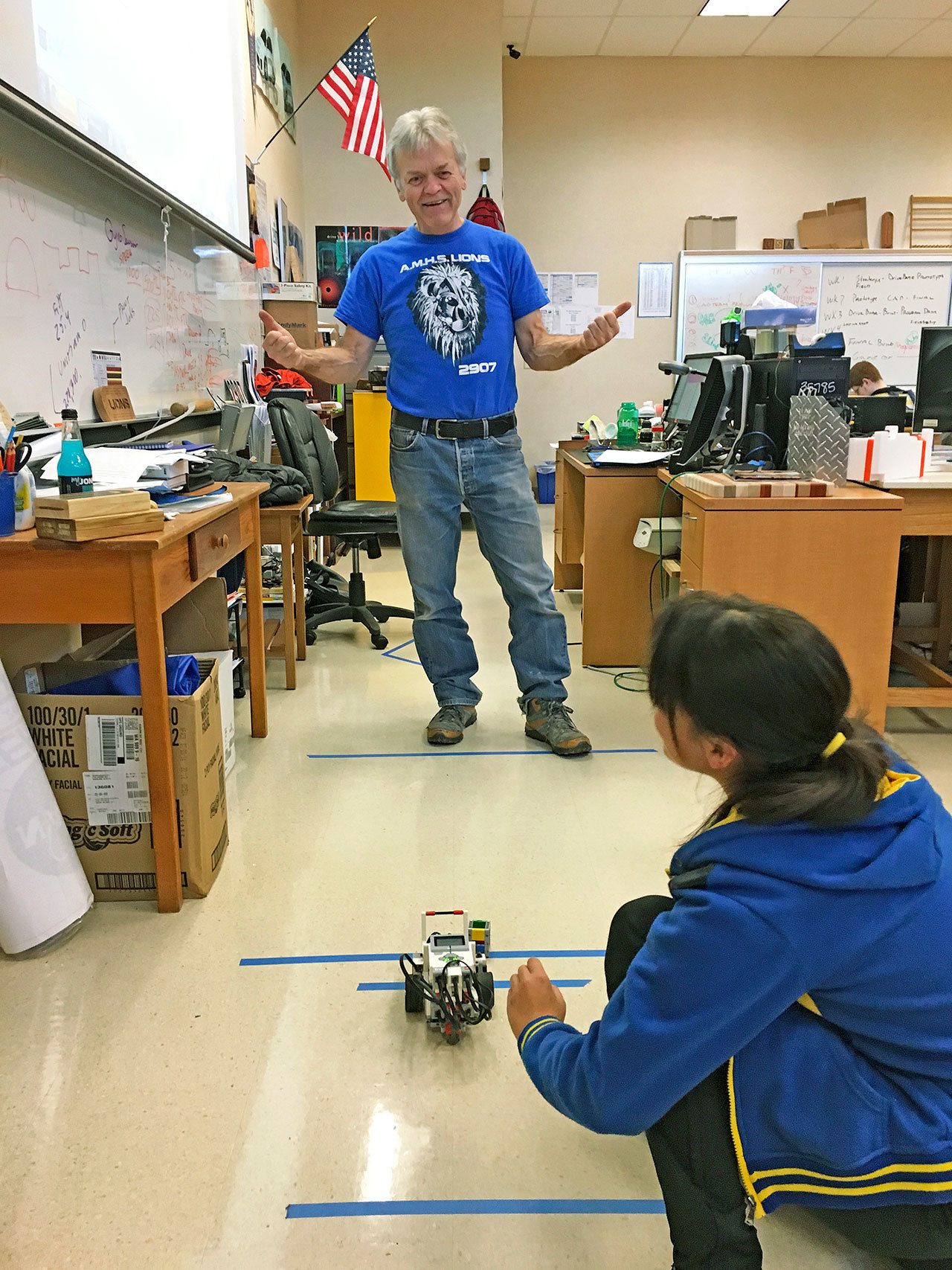Students lined up, and one-by-one placed their EV3 robots on a swivel chair to examine their modifications.
It was a trial-and-error process.
Auburn Mountainview teacher Tim Scott often employs that strategy of using instructional techniques to move students toward greater understanding and independence, known in the teaching profession as “scaffolding” in the classroom.
That philosophy, and his dedication to student learning, recently helped earn Scott recognition as one of Symetra’s “Heroes in the Classroom,” which recognizes 16 Seattle-area teachers “for their outstanding contribution to the kids in our community.” Becky Clowers, whose daughter, Allison, is a senior at Auburn Mountainview, nominated him.
“If anybody ever has any questions, he stops what he’s doing to answer them,” said the younger Clowers, whose older sister, Marissa, also had Scott as a teacher. “He doesn’t give you the answer, he really helps you figure it out for yourself.”
Clowers’ mother also praised Scott’s “hands-on approach of teaching” in her nomination.
“Mr. Scott also mentors the robotics team, where he challenges students to go outside their comfort zones and try things they can’t imagine doing,” Clowers wrote in her nomination. “He has taken what began as a small group and grown it into one of the biggest clubs on campus. Mr. Scott leads, inspires and works alongside the team, volunteering countless hours each year. He pushes the students to think big and continually improve as they grow together as a team. Auburn Mountainview High School Robotics would not have advanced to the world championship for the past four years without Tim Scott’s guidance and vision.”
Matthew Steen, a junior, shared similar sentiments. He said he played with Legos™ as a youth but did not become engaged in robotics until he joined the FIRST Robotics Club (FRC) at Auburn Mountainview. FIRST stands for Inspiration and Recognition of Science and Technology.
“I came here, gave FRC a try, and right from the get-go Mr. Scott recognized that I had a talent for this sort of thing, and he put me in charge of one of the two teams,” said Steen, adding that each team had five participants.
From there, Steen described the intense process – and dedication – that has propelled the FRC into one of the area’s top programs. Leading up to the regional competition each February, the FRC has six weeks to develop its robot. Steen said that means working on the project throughout the school week and on Saturdays. During the final week, Steen said, it is not uncommon for the team to leave school between 8 p.m. and midnight before it wraps up the project with a 16-hour effort that Saturday.
Steen said the robot used at last year’s national championship competition in April in St. Louis had a six-wheel tank drive with “a 360-degree shooter that could self-adjust,” among other details, such as moots, gates and a drawbridge to fit the medieval theme.
Scott, he said, is an integral part of the FRC’s success.
“Without him, our teams wouldn’t go anywhere,” Steen said. “He’s kind of the inspiration behind what we’re doing.
“He lets kids think out their own strategies. He lends his own little advice here and there. He won’t tell you how to do it.”
Scott has been at Auburn Mountainview since it opened in 2005. The school’s robotics program launched four years later.
“I’ve been doing industrial technology all my life,” said Scott, adding that picking up the robotics program, along with his other teaching duties, which include woodworking and engineering, made sense. “It’s working with kids and solving problems.”
Scott received a $1,000 grant from Symetra, which he said he will reinvest in the classroom.
“It caught me by surprise,” Scott said of the recognition. “It was really cool to be recognized for efforts in the classroom.”
One that Steen – and others – acknowledged before Scott was honored.
“Through this program, I’ve learned of a degree that’s coming to light more: mechatronics,” he said. “It basically gives you the certification to work on robots, and that’s something I really want to do.”



